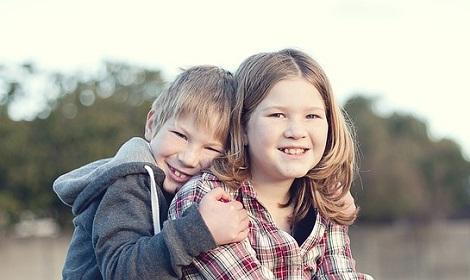
Published on: 03/04/19
In the first of a two-part series we look at the sibling’s experience of an ABI and consider the different stages of recovery.

Published on: 03/04/19
(First published 11 April 2018)
When a child has an acquired brain injury, siblings may face a particularly difficult time. How a brother or sister responds may depend on their age, maturity and temperament.
Relationships between siblings are often as complicated as they are caring. And they are unlike any other – they are usually the longest relationships we have over our lifetimes. And a sibling may be one of the most important players in the team around an injured child.
Siblings may share the initial shock of an accident or sudden injury, and they may also be directly affected or injured themselves.
Siblings may experience anxiety, pressure, anger, jealousy, depression and loneliness. Some children may feel they have lost some of their parents’ affection and attention.
It might be difficult for a young child to understand why their brother or sister is treated differently from them. They may not know why they get told off for certain behaviour while the injured child seems to ‘get away with it’.
In addition, the injured child may take out some of their anger or frustration on siblings. Some younger children may even worry they can ‘catch’ an illness from their sibling.
Siblings might feel guilty about what has happened (sometimes called ‘survivor guilt’). They may feel guilty about expressing their own feelings because they don’t want to add to the burden on their parents. They may feel worried about their injured sibling and their parents.
They may find it hard to understand changes in their sibling’s personality or behaviour. They may find it embarrassing and may be wary about having friends to visit at home. Siblings may feel excluded, and that adults are not telling them what is happening.
Casey’s sister went from pillar to post, really. I think she felt very out of the way. But all we could think about at the time was Casey’s health."
Having a child in hospital can throw a family into chaos. Parents may be under enormous strain, or in a state of shock. Siblings may well experience their own feelings of shock. If they have witnessed or were involved in an accident, they may develop post-traumatic stress disorder themselves.
The familiar routine may disappear very quickly and siblings may have to stay with grandparents, friends or relatives, which may leave them feeling ‘left out’ or isolated. They may miss school because of what has happened.
It is inevitable that the family will focus on the injured child, but siblings may not understand this and may feel neglected. They may need reassurance that they are cared for, safe and secure.
Some children with ABI go on to a rehabilitation programme after hospital. Much like a hospital, a specialist centre can be a strange and unfamiliar place for a sibling. And again, their daily routine may change entirely. In some circumstances, it may be useful for siblings to sit in on therapy sessions. It may help them understand what is going on, and appreciate what hard work rehabilitation can be.
An injured child’s return home from hospital or a rehabilitation centre is sometimes a time of particular strain for all the family. Children may experience confusion and anxiety about the shifts and changes within the family. Some younger siblings may need to become more like older siblings as they take care of their brother or sister.
The relationship between parents and sibling may be affected. The child with an acquired brain injury may see their younger sibling ‘overtake’ them, and this often needs very careful handling.
If siblings take on extra responsibility, then a parent may worry they are ‘growing up too quickly’. The siblings themselves may have difficulties with behaviour, or become withdrawn.
In part two of our series on siblings and ABI we look at how parents can help siblings in terms of the information they share and talking to them.